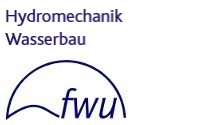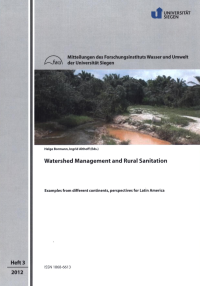Mitteilungen des Forschungsinstituts Wasser und Umwelt der Universität Siegen
Watershed Management and Rural Sanitation
Examples from different continents, perspectives for Latin America
The existence of water on Earth is vital to the existence of life on Earth. All known forms of life depend on water. But water does not only nourish ecosystems. It powers industry, grows food and makes human life possible. Thus, most human activities depend on the availability of water in appropriate quantity and quality, as well.
Civilization has historically flourished around rivers and major waterways. Such behavior guaranteed the continuous water supply and enabled the people to use rivers as traffic routes, as well. However, since most hydrological systems are characterized by a natural spatiotemporal variability, management of freshwater resources has always been an important task for civilization.
Population growth and industrialization in most parts of the earth have increased the pressure on the water resources in the last century, not only with regard to water quantity but also to water quality. On the one hand, water had to be provided for growing communities – for personal use, for food production and for industrial purposes. On the other hand, increasing amounts of wastewater were polluting the natural freshwater resources such as surface and groundwater. Agricultural areas have been extended, and production systems have been industrialized, often based on the uncontrolled use of agrochemicals.
Thus, due to population growth and excessive use of water resources, in many parts of the earth water is a scarce resource already today, in particular with respect to clean drinking water. Expected future change (e.g., in climate, demography, food production, industrial activities) might even aggravate this situation.
Integrated water resources management (IWRM) is a promising instrument from which many people and organizations believe that it can assist in solving some of these water related problems. Central elements of IWRM are cooperation (people, organizations, sectors), coordination (use of land and water resources, upstream vs. downstream issues), participation (stakeholder, actors), integration (water quality and quantity, surface and subsurface water) and capacity building.
IWRM aims at maximizing economic and social welfare in an equitable manner without compromising the sustainability of vital ecosystems. Thus, IWRM aims high which is not easily to achieve. But, each part of the puzzle contributes to the whole picture, and each even disciplinary study on water related issues may gain more insight into the water related issues and solutions.
This third volume of the „Mitteilungen des Forschungsinstituts Wasser und Umwelt“ covers large parts of the above mentioned water related issues, focusing on Latin America. It consists of contributions to a DAAD expert seminar on the topic of “Rural sanitation and Watershed management”, held at Joao Pessoa in September 2009. The contributions range from drinking water supply to the discussion of the sanitation challenge, from the impact of agriculture to those of mining activities, from irrigation to reservoir operation. From a technical point of view, it covers the analysis of legal aspects, modeling issues and the interpretation of water quality related observations.
Due to a period of transition with respect to the direction of the Chair for Water Management at University Siegen it has taken more time than expected to finish this volume and publish the presentations of the expert seminar. However, we hope that this volume is still useful for the participants of the seminar for their every day work. We thank the authors for their contributions, the DAAD (German Academic Exchange Service) for the financial support enabling the organization of the expert seminar and, last but not least, the local organizers who took care of all practical questions during the seminar. Thanks a lot!
Helge Bormann
Impressum:
| Helge Bormann, Ingrid Althoff (Eds.) | |
| Watershed Management and Rural Sanitation Examples from different continents, perspectives for Latin America |
|
| Erscheingsungsort: | Siegen |
| Erscheingsungsjahr: | 2012 |
| D 476 | |
|
Mitteilungen des Forschungsinstituts Wasser und Umwelt der Universität Siegen Heft 3 | 2012 |
|
| Herausgeber: |
Forschungsinstitut Wasser und Umwelt (fwu) der Universität Siegen Paul-Bonatz-Str. 9-11 57076 Siegen |
| Druck: | UniPrint, Universität Siegen |
| ISSN 1868-6613 | |




